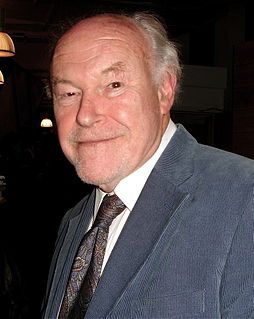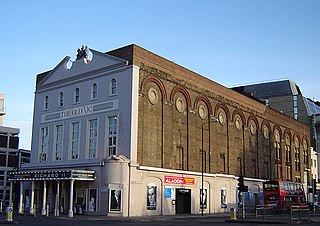Related Research Articles

Sir Ian Murray McKellen is an English actor. His career spans seven decades, having performed in genres ranging from Shakespearean and modern theatre to popular fantasy and science fiction. Regarded as a British cultural icon, he has received various accolades, including seven Laurence Olivier Awards, a Tony Award, and a Golden Globe Award. The BBC states that his "performances have guaranteed him a place in the canon of English stage and film actors".

Timothy Lancaster West, CBE is an English actor and presenter. He has appeared frequently on both stage and television, including stints in both Coronation Street and EastEnders, and also in Not Going Out, as the original Geoffrey Adams. He is married to the actress Prunella Scales; since 2014 they have been seen travelling together on British and overseas canals in the Channel 4 series Great Canal Journeys.

Sir Peter Reginald Frederick Hall CBE was an English theatre, opera and film director. His obituary in The Times declared him "the most important figure in British theatre for half a century" and on his death, a Royal National Theatre statement declared that Hall's "influence on the artistic life of Britain in the 20th century was unparalleled". In 2018, the Laurence Olivier Awards, recognizing achievements in London theatre, changed the award for Best Director to the Sir Peter Hall Award for Best Director.

The Old Vic is a 1,000-seat, not-for-profit producing theatre in Waterloo, London, England. Established in 1818 as the Royal Coburg Theatre, and renamed in 1833 the Royal Victoria Theatre. In 1871 it was rebuilt and reopened as the Royal Victoria Palace. It was taken over by Emma Cons in 1880 and formally named the Royal Victoria Hall, although by that time it was already known as the "Old Vic". In 1898, a niece of Cons, Lilian Baylis, assumed management and began a series of Shakespeare productions in 1914. The building was damaged in 1940 during air raids and it became a Grade II* listed building in 1951 after it reopened.

Sir William Tyrone Guthrie was an English theatrical director instrumental in the founding of the Stratford Festival of Canada, the Guthrie Theater in Minneapolis, Minnesota, and the Tyrone Guthrie Centre at his family's ancestral home, Annaghmakerrig, near Newbliss in County Monaghan, Ireland. He is famous for his original approach to Shakespearean and modern drama.

Matthew Warchus is a British theatre director, filmmaker, lyricst, and playwright. He has been the Artistic Director of London's The Old Vic since September 2015.

Theatr Clwyd is a regional arts centre and producing theatre 1 mile (1.6 km) from Mold, Flintshire, in North East Wales. It opened as Theatr Clwyd in 1976, but was known between 1998 and 2015 as Clwyd Theatr Cymru, before reverting to its original name.
Clifford Williams was a Welsh theatre director and stage actor. He was born in Cardiff, Wales and died in London, England.
David Berthold is one of Australia's most prominent theatre directors and cultural leaders. He has directed for most of Australia's major theatre companies, as well as in London and Berlin, and has led several key arts organisations. He was Artistic Director of Brisbane Festival, one of Australia's major international arts festivals and Queensland’s largest arts and cultural event. Through his tenure of five festivals, 2015–19, Berthold transformed the Festival into Australia's largest major international arts festival, presenting more works to more people than any other, with an audience of more than one million people.

Sean Gerard Mathias is a Welsh actor, director, and writer. He is known for directing the film Bent and for directing highly acclaimed theatre productions in London, New York City, Cape Town, Los Angeles and Sydney.
Colin George was a Welsh actor and director, who was the founding Artistic Director of the Crucible Theatre in Sheffield (1971).
Robert Leadam Eddison, OBE was an English actor, who despite his lengthy career as a classical stage actor, is probably most widely remembered in the role of the Grail Knight in Indiana Jones and the Last Crusade. He also played Merlin in the BBC television series The Legend of King Arthur, and the tragic ferryman in The Storyteller episode "The Luck Child".

Cambridge Arts Theatre is a 666-seat theatre on Peas Hill and St Edward's Passage in central Cambridge, England. The theatre presents a varied mix of drama, dance, opera and pantomime. It attracts some of the highest-quality touring productions in the country, as well as many shows direct from, or prior to, seasons in the West End. Its annual Christmas pantomime is an established tradition in the city. From 1969 to 1985, the theatre was also home to the Cambridge Theatre Company, a renowned national touring company. The Cambridge Arts Theatre was founded in 1936 by the famous Cambridge economist and statesman John Maynard Keynes.
Richard Cottrell is an English theatre director. He has been the Director of the Cambridge Theatre Company and the Bristol Old Vic in England, and of the Nimrod Theatre in Sydney, Australia. He has also directed for the Royal Shakespeare Company, the Chichester Festival, the Stratford Shakespeare Festival in Stratford, Ontario, the National Theatre of Portugal, and other theatre companies around the world.

Birmingham Repertory Theatre, commonly called Birmingham Rep or just The Rep, is a producing theatre based on Centenary Square in Birmingham, England. Founded by Barry Jackson, it is the longest-established of Britain's building-based theatre companies and one of its most consistently innovative.
Simon Godwin is an English theatre director based in Washington, DC, where he is currently serving as artistic director of the Shakespeare Theatre Company. Previously he was based in London, serving as associate director of London's National Theatre, associate director of the Royal Court Theatre and associate director at Bristol Old Vic.
Tom Morris, OBE is an English theatre director, writer and producer. He was the Artistic Director at BAC from 1995-2004, he has been Associate Director at the National Theatre since 2004 and Artistic Director of Bristol Old Vic since 2009.

Iain Mackintosh is a British practitioner of theatre combining four interwoven careers as theatre producer, theatre space designer, curator of theatre painting and architecture exhibitions, and author and lecturer on both modern and eighteenth century theatre. He has campaigned for the retention and restoration of historic theatres as working homes for live performance.
The Prospect Theatre Company was an English company founded, as Prospect Productions, in 1961. Based at the Arts Theatre, Cambridge from 1964 until 1969, the company, with Toby Robertson as artistic director and Richard Cottrell as associate director, toured both nationally and internationally with a mainly classical repertoire, providing notable appearances of such actors as Ian McKellen and Timothy West. The company became closely associated with the Edinburgh Festival after its first appearance there in 1967. Separating from the Arts Theatre in 1969, the company, renamed The Prospect Theatre Company, survived without a permanent base for the next eight years under the direction of Toby Robertson, mounting productions in which Derek Jacobi and Dorothy Tutin made significant appearances. Eventually the company found a new home at London's Old Vic in 1977: two years later it became the Old Vic Theatre Company. Though noted for its exemplary ensemble playing, the company lost its Arts Council of Great Britain funding in 1980 after Timothy West's first season as Robertson's successor, leading to Prospect's demise.
Valentine Gilbert Delabere "Val" May, CBE was an English theatre director and artistic director. He led the Bristol Old Vic from 1961 to 1975, and the Yvonne Arnaud Theatre from 1975 to 1992.
References
- 1 2 3 4 5 6 7 8 9 Coveney, Michael (8 July 2012). "Toby Robertson obituary". The Guardian . Retrieved 16 September 2013.
- ↑ "Prospect Theatre Company". Ian McKellen Stage. Retrieved 4 September 2014.
- 1 2 3 "Toby Robertson (Obituary)". The Daily Telegraph . 6 September 2012. Retrieved 16 September 2013.
- 1 2 Steven, Alasdair (6 September 2012). "Obituary: Toby Robertson, OBE, theatre director". The Scotsman. The Scotsman . Retrieved 16 September 2013.
- ↑ Rowell, p. 158
- ↑ Hunter, Adriana (2006). "Prospect Theatre Company" in Continuum Companion to Twentieth Century Theatre. A&C Black. p. 623. ISBN 9781847140012.
- ↑ Rowell, p. 160
- ↑ Quoted in Rowell, p. 160